Related Research Articles

Auguste Émile Faguet was a French author and literary critic.

Ferdinand Brunetière was a French writer and critic.

Godefroid Kurth (1847–1916) was a celebrated Belgian historian and pioneering Christian democrat. He is known for his histories of the city of Liège in the Middle Ages and of Belgium, his Catholic account of the formation of modern Europe in Les Origines de la civilisation moderne, and his defence of the medieval guild system.

Gustave Lanson was a French historian and literary critic. He taught at the Sorbonne and the École Normale Supérieure in Paris. A dominant figure in French literary criticism, he influenced several generations of writers and critics through his teachings, which were anti-systematic and promoted a scrupulous and erudite approach to texts via extensive firsthand research, inventorying, and in-depth historical investigation.
Henry Moeller (1852–1918) was a Belgian priest and literary critic, who for twenty years edited the cultural review Durendal.
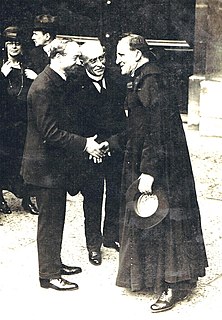
Henri Brémond was a French literary scholar, sometime Jesuit, and Catholic philosopher, one of the theological modernists.

Alfred-Henri-Marie Baudrillart, Orat. was a French prelate of the Catholic Church, who became a Cardinal in 1935. An historian and writer, he served as Rector of the Institut Catholique de Paris from 1907 until his death. He campaigned to rouse international support for France during the First World War, while in the Second World War he supported the Vichy regime and backed the Germans for leading the international struggle against bolshevism.
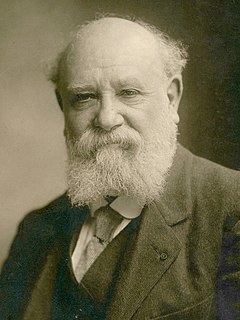
Charles Le Goffic was a Breton poet, novelist and historian whose influence was especially strong in his native Brittany. He was a member of the Académie française.

Marie-Eugène-Melchior, vicomte de Vogüé was a French diplomat, Orientalist, travel writer, archaeologist, philanthropist and literary critic.

Pierre Batiffol – was a French Catholic priest and prominent theologian, specialising in Church history. He had also a particular interest in the history of dogma.
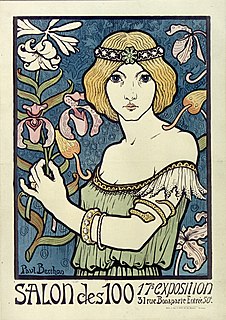
Salon des Cent was a commercial art exhibition in Paris, based at 31 Rue Bonaparte. The Salon sold color posters, prints and reproductions of artwork to the general public at reasonable prices. It was established in February 1894 by Léon Deschamps, founder of La Plume an avant garde literary and artistic magazine. It became known for its exhibitions showcasing the works of contemporary graphical artists. The salon held exhibitions until 1900. Many of the posters advertising Salon des Cent exhibitions have themselves become collectors' items.

Alexandre Mercereau was a French symbolist poet and critic associated with Unanimism and the Abbaye de Créteil. He founded the Villa Médicis Libre, which helped impoverished artists and operated as charitable reformatory for delinquent teenagers. Mercereau's work inspired the revolutionary artistic movement of the early 20th century known as Cubism.

Paul Biva was a French painter. His paintings, both Realist, Naturalist in effect, principally represented intricate landscape paintings or elaborate flower settings, much as the work of his older brother, the artist Henri Biva (1848–1929). Paul Biva was a distinguished member of National Horticultural Society of France from 1898 until his untimely death two years later.
Events in the year 1894 in Belgium.

Bruno Destrée (1867-1919) was a Benedictine monk, a French-language poet, and a Belgian literary critic. He was the brother of the politician Jules Destrée.
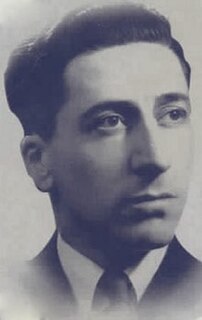
Jean d'Azémar de Fabrègues was a French Catholic intellectual and journalist. He was a "traditional" Catholic, rejecting the materialism of both liberal democracy and the totalitarian regimes of the right and the left.
Le Magasin littéraire et scientifique, from 1891 simply Le Magasin littéraire, was a French-language review of science and culture published in Ghent, Belgium, from 1884 to 1898. Initially quarterly, it was published every two months 1885–1888, monthly 1889–1897, and every two months in 1898. It was printed and published by Alfons Siffer, who also published its Dutch-language counterpart, Het Belfort.
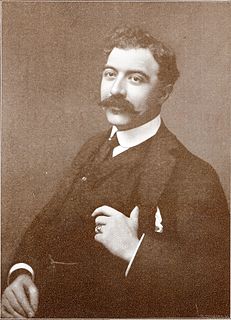
Thomas Braun (1876–1961) was a Belgian lawyer and French-language poet. He also published under the pen names Bonissart, Brunissart, and Ranhissart.
Pol Demade (1863–1936) was a Belgian writer who also published under the pen name Jean Suis.
Josephus Maria Remisius Firminus van den Bosch, better known as Firmin van den Bosch (1864–1949) was a Belgian magistrate and writer.
References
- 1 2 "Durendal: Revue catholique d'art et de littérature (1894-1914; 1921)". Périodiques numérisés dans le cadre de l'Action de Recherche Concertée. Université libre de Bruxelles.
- ↑ Cécile Vanderpelen-Diagre, Ecrire en Belgique sous le regard de Dieu (Éditions Complexe, 2004), p. 27.
- ↑ Album du salon d'art religieux de Durendal. Compagnie Générale d'Impressions. 1900 – via archive.org.